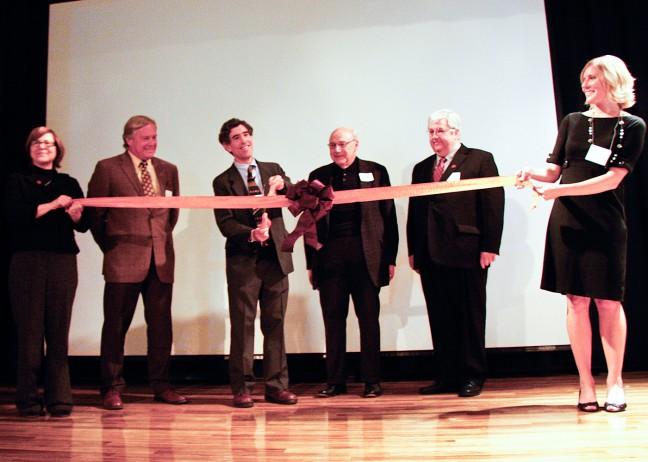An orange ribbon and deep maroon bow marked the opening celebration of a first-of-its-kind research center at the University of Wisconsin at the Waisman Center Monday.
The new Center for Investigating Healthy Minds focuses on the adaptability and nourishing of the mind to change it for the better, said Director Richard Davidson.
Research at the center examines positive aspects of the brain like kindness and compassion, Davidson said, in contrast to more traditional methods of studying fear and anxiety.
With the idea that through cultivation of positive qualities, an individual can transform their mind, the center aims to apply their research to individuals, such as children with autism, who can benefit from practices like meditation or yoga, Davidson said.
CIHM offers a unique splash of color compared to its surrounding stark white hallways. The entrance welcomes the visitor with deep maroon wall paint and orange and yellow paper cranes strung from the ceiling.
Inside, the center provides a home for scientists, graduate students, post docs and community members, said CIHM’s director of communications and marketing Mel Charbonneau.
But once inside the meditation room – a unique feature of the center – natural lighting and large, white archways transform maroon mats and pillows lining the floor into a calm, serene area.
With sound proofed walls lining the hallway to the room, the echoes and sounds of daily office work are silenced, Charbonneau said.
The environmentally-friendly designed room, complete with heated cork floors requiring the removal of shoes, has already been used, despite the center just having opened to staff about three weeks ago, Charbonneau said
While the space will aid in research at the center, it will also be shared with the community to help engage them in the center’s work, she said.
CIHM is the first center ever to combine a meditation room with research from various disciplines together in the same space, said Ulco Uisser, chair of CIHM strategic advisory board.
The space allows scientists to engage in and understand meditation themselves, Uisser added.
According to Davidson, meditation is critical for their research as a “principle vehicle for training the mind.”
Using practices like meditation, the center’s research will involve working with groups such as local schools and returning veterans to determine how these practices can help people, Davidson said.
With positive outcomes of the research, Davidson said he hopes CIHM can be a national and international example of incorporating practices for nourishing the brain into institutions throughout the world.
“We hope this center will bring a lot of recognition to the university and have impact throughout our state, throughout our nation and indeed throughout our world,” Davidson said.
Tenzin Gyatso, the 14th Dalai Lama, a supporter of CIHM’s research and inspiration for Davidson, donated $50,000 to fund the center’s research. Geshe Sopa, a former tutor to His Holiness, attended the event and offered a prayer during the ceremony.
Davidson said he was deeply moved by the unexpected gift and spoke of the Dalai Lama’s own mission to extend nourishment of the mind to humanity.
“His very presence is a reminder of what is possible in terms of cultivating positive qualities of the mind,” Davidson said.


